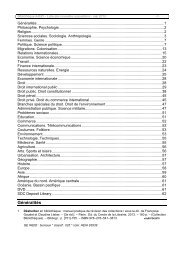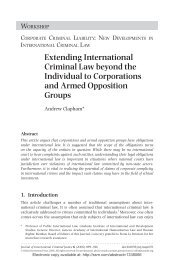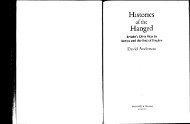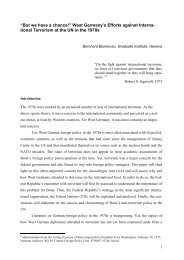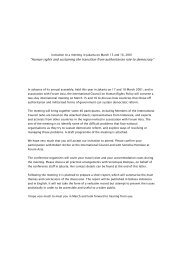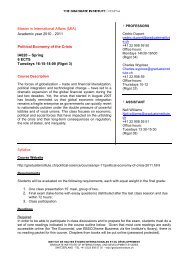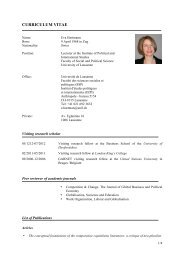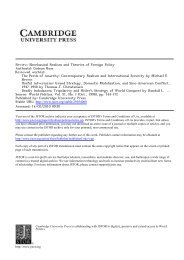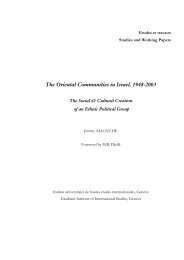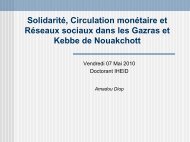Download [pdf] - The Graduate Institute, Geneva
Download [pdf] - The Graduate Institute, Geneva
Download [pdf] - The Graduate Institute, Geneva
You also want an ePaper? Increase the reach of your titles
YUMPU automatically turns print PDFs into web optimized ePapers that Google loves.
EUROPE TWENTY YEARS<br />
AFTER THE END OF THE COLD WAR:<br />
THE NEW EUROPE, NEW EUROPES?<br />
L’EUROPE VINGT ANS APRÈS<br />
LA FIN DE LA GUERRE FROIDE :<br />
NOUVELLE EUROPE, NOUVELLES EUROPES ?<br />
Edited by / sous la direction de Bruno Arcidiacono, Katrin Milzow, Axel Marion,<br />
and Pierre-Etienne Bourneuf<br />
Published in 2012 when the Nobel Committee awarded the European Union its Peace Prize, the book<br />
Europe Twenty Years after the End of the Cold War asks how Europe has evolved over the two decades<br />
after the fall of the Soviet Union. It looks at whether this has led to the emergence of a new<br />
political space, how the EU has changed with the integration of new members from Central and<br />
Eastern Europe, and how the perception of the continent has changed in the eyes of its inhabitants.<br />
<strong>The</strong> work was edited by Bruno Arcidiacono, Professor of International History, Katrin Milzow, Axel<br />
Marion, and Pierre-Etienne Bourneuf, <strong>Graduate</strong> <strong>Institute</strong> PhD graduates. <strong>The</strong> book compiles nearly<br />
20 articles from distinguished scholars and young researchers, including Katrin Milzow, Axel Marion,<br />
and <strong>Institute</strong> Assistant Professor Annabelle Littoz-Monnet. Published by Peter Lang Academic<br />
Publishers, it is the result of a conference entitled Europe Twenty Years after the end of the Cold War<br />
organised in October 2010 by the <strong>Institute</strong> and the Pierre du Bois Foundation for Current History.<br />
Euroclio 65. Bruxelles, New York:<br />
P.I.E. Peter Lang. 2012. 330 p.<br />
PRIVATIZING WAR<br />
PRIVATE MILITARY AND SECURITY<br />
COMPANIES UNDER PUBLIC<br />
INTERNATIONAL LAW<br />
Vincent Chetail and Lindsey Cameron<br />
A growing number of states use private military and security companies (PMSCs) for a variety of<br />
tasks, which were traditionally fulfilled by soldiers. This book provides a comprehensive analysis of<br />
the law that applies to PMSCs active in situations of armed conflict, focusing on international humanitarian<br />
law. It examines the limits in international law on how states may use private actors, taking<br />
the debate beyond the question of whether PMSCs are mercenaries. <strong>The</strong> authors delve into issues<br />
such as how PMSCs are bound by humanitarian law, whether their staff are civilians or combatants,<br />
and how the use of force in self-defence relates to direct participation in hostilities, a key issue for<br />
an industry that operates by exploiting the right to use force in self-defence. Throughout, the authors<br />
identify how existing legal obligations, including under state and individual criminal responsibility,<br />
should play a role in the regulation of the industry.<br />
Cambridge: Cambridge University<br />
Press. March 2013. 768 p.<br />
This book is the result of a research project supervised by Professor Vincent Chetail (<strong>Graduate</strong><br />
<strong>Institute</strong>) and Professor Marco Sassòli (University of <strong>Geneva</strong>). <strong>The</strong> project was financed by the Swiss<br />
National Science Foundation and carried out within the <strong>Geneva</strong> Academy of International Humanitarian<br />
Law and Human Rights.<br />
LA REVUE DE L’INSTITUT I THE GRADUATE INSTITUTE REVIEW I GLOBE I N11 Printemps I Spring 2013<br />
33


![Download [pdf] - The Graduate Institute, Geneva](https://img.yumpu.com/23370020/34/500x640/download-pdf-the-graduate-institute-geneva.jpg)
